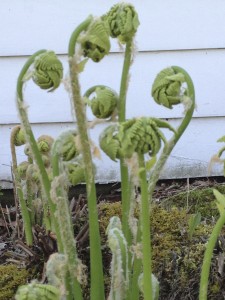 Here come the ferns again! At this point they look like bunched, slightly hairy yellow knuckles punching their way out of the ground. Within the next week or two they’ll be a foot high, grouped in small green pods, facing inward, like close-knit families of aliens.
Here come the ferns again! At this point they look like bunched, slightly hairy yellow knuckles punching their way out of the ground. Within the next week or two they’ll be a foot high, grouped in small green pods, facing inward, like close-knit families of aliens.
There is something otherworldly about them. They reproduce from spores and have neither seeds nor flowers. Their fiddleheads unfurl into fronds as they grow, delicate as butterfly wings. Despite their seeming fragility, ferns have staying power. Among the first plants to
shoot up every spring, they hold their 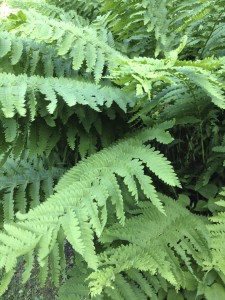 shape and color throughout the summer and only collapse under the weight of late October’s hardest-hitting frosts. They first appeared on the fossil record over 360 million years ago, making them the oldest documented species on earth.
shape and color throughout the summer and only collapse under the weight of late October’s hardest-hitting frosts. They first appeared on the fossil record over 360 million years ago, making them the oldest documented species on earth.
They’re a boon for gardeners as they thrive in the shade where most plants fail. Ours routinely grow to six feet high and create a hedge-like effect along the back of the garage and house. The edible fiddleheads contain more antioxidants than blueberries and are packed with omega-3 fatty acids and dietary fiber. What’s more, when steamed or sauteed with a little 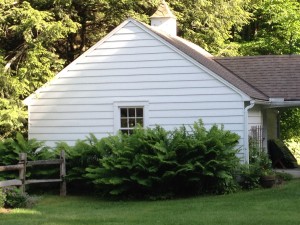 olive oil and garlic, they have a uniquely earthy taste — like taking a bite directly out of early spring itself.
olive oil and garlic, they have a uniquely earthy taste — like taking a bite directly out of early spring itself.
Here’s a poem about ferns by Ted Hughes — long-time Poet Laureate of Britain — who wrote some of the greatest nature poems of the twentieth century.
FERN
Ted Hughes 1930 – 1998
Here is the fern’s frond, unfurling a gesture,
Like a conductor whose music will now be pause
And the one note of silence
To which the whole earth dances gravely –
A dancer, leftover, among crumbs and remains
Of God’s drunken supper,
Dancing to start things up again.
And they do start up – to the one note of silence.
The mouse’s ear unfurls its trust.
The spider takes up her bequest.
And the retina
Reins the Creation with a bridle of water.
How many went under? Everything up to this point went under.
Now they start up again
Dancing gravely, like the plume
Of a warrior returning, under the low hills,
Into his own kingdom.


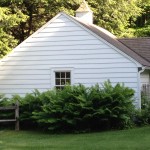
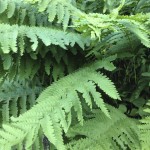
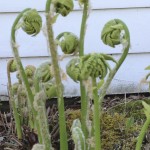
Beautiful. And,makes we want to eat some fiddleheads soon, splashed with olive oil .
They’re also wonderful with sautéed morels which we can sometimes find growing wild in our woods. Both taste of the earth from which they sprung! Wishing you a happy spring, Cheryl!
Love this post Liza full of feeling for a plant I often take for granted, and I hadn’t read the Hughes poem before. Love that repetition of the words “dancing gravely” —
Patty
Thanks, Patty — and I love the warrior returning to his own country.
the fiddleheads look like lampposts in the belle epoch era of Paris…
sautéed in olive oil & garlic: bon apetite!
They do look like old lamp posts, Annette! Happy spring!
Thank you, Liza. Your post has given me”food for thought” about the lovely ferns that I love so much..
I love the image of a conductor in this poem.
Thank you, Lorraine. Yes, and that “pause” which I’m still trying to parse — but whatever it means, it’s beautiful!
I love my ferns…they flourish in Florida without needing too much supervision! Didn’t know they were edible 🙂
I also love the way you describe ferns. Thank you.
It is interesting that the 2nd stanza of “Ferns” was omitted in “Ted Hughes Selected Poems 1957-1967”. The fourth stanza (in your version) reads like this:
And, among them, the fern
Dances gravely, like the plume
Of a warrior returning, under the low hills,
I will definitely stirfry some fiddleheads.
Thanks, Vera. That’s interesting about the different versions, he must have made the change for the Selected Poems. I think I prefer the version I included, especially the last line:
Into his own kingdom.
Enjoy your stirfry! –Liza